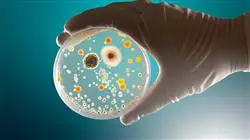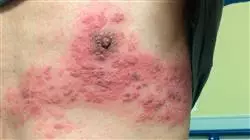University certificate
The world's largest faculty of pharmacy”
Introduction to the Program
With this Postgraduate certificate, you have the opportunity to update your knowledge in a comfortable way and without renouncing the highest scientific standards, to incorporate the latest advances in the approach to infectious pathology in your daily pharmaceutical practice"

Infectious diseases remain the leading cause of death and disability in the world. In 2016, of the total 56.4 million deaths worldwide, 33% were due to infectious diseases, 30% to cardiovascular diseases and 10% to cancer. The fight against disease will have two simultaneous fronts: infectious diseases and chronic non-communicable diseases.
Among the 17.3 million people who died from infections in 2016, the most frequent causes of death were lower respiratory infections (3.7 million), malaria (2.2 million), tuberculosis (1.3 million), diarrhea (1.4 million), and HIV/AIDS infection (1.1 million). The most important factors to consider in relation to infectious diseases are demographics, human behavior, technological and industrial development, economic variations in land use, intercontinental travelling and commerce, climate change, microbiotic adaptation and finally the disappearance or reduction of efficient public health measures.
These factors, interacting with each other, have conditioned that we should not consider any part of the planet reasonably isolated from the rest, nor impossible the appearance, reappearance or dissemination of imported or apparently eradicated infectious diseases in our environment.
The complex international epidemiological situation so far this century, exemplified by the deliberate release of bacillus anthracis spores, the emergence of West Nile virus, the epidemic of severe acute respiratory syndrome (SARS), the zoonotic spread of smallpox, the threat of pandemic influenza, the Ebola epidemic in Africa, the emergence of cases of yellow fever, Dengue and Cholera, the emergence of new arbovirosis in the Americas region, such as Chikingunya and more recently Zika, together with morbidity from other endemic infectious diseases, such as HIV/AIDS, leptospirosis, tuberculosis, pneumonia and the increase in antibiotic resistance with the development of multi-resistant bacteria, highlight the unprecedented need to improve the process of training and development of human capital.
Update your knowledge in infections management and improve your professional assessment as a pharmacist"
This Postgraduate certificate in The Clinical Method and Scientific Research in Infectious Diseases contains the most complete and up-to-date scientific program on the market. The most important features include:
- Clinical cases presented by experts in The Clinical Method and Scientific Research in Infectious Diseases
- The graphic, schematic, and practical contents with which they are created provide scientific and practical information on the disciplines that are essential for professional practice
- New developments on The Clinical Method and Scientific Research in Infectious Diseases
- Practical exercises where the self-assessment process can be carried out to improve learning
- An algorithm-based interactive learning system for decision-making in the clinical situations presented throughout the course
- Theoretical lessons, questions to the expert, debate forums on controversial topics, and individual reflection assignments
- Content that is accessible from any fixed or portable device with an Internet connection
TECH brings to this program the highest scientific rigor with the objective of training the most reputable pharmacists in the sector"
Its faculty is made up of prestigious and renowned professionals, with a long history in health care, teaching and research, who have worked in many countries on several continents, developing a professional and teaching experience that they deliver in an extraordinary way in this Postgraduate certificate.
The methodological design of this Postgraduate certificate, developed by a multidisciplinary team of e-learning experts, integrates the latest advances in educational technology for the creation of numerous multimedia educational tools that allow the professional, based primarily on the problem-solving method, to face the solution of real problems in their daily clinical practice, which will allow them to progress in the acquisition of knowledge and the development of skills that will impact their future professional work.
It should be noted that each of the contents generated, as well as the videos, self-tests, clinical cases and modular exams have been thoroughly reviewed, updated and integrated by the professors and the team of experts that make up the working group, in order to facilitate the learning process in a didactic way that will allow the objectives of the teaching program to be achieved.
This is the opportunity you were looking for to grow as a pharmacist and get updated on the The Clinical Method and Scientific Research in Infectious Diseases"

Do not miss the opportunity to learn about the advances in the treatment of infections to incorporate them into your daily pharmaceutical practice"
Why study at TECH?
TECH is the world’s largest online university. With an impressive catalog of more than 14,000 university programs available in 11 languages, it is positioned as a leader in employability, with a 99% job placement rate. In addition, it relies on an enormous faculty of more than 6,000 professors of the highest international renown.

Study at the world's largest online university and guarantee your professional success. The future starts at TECH”
The world’s best online university according to FORBES
The prestigious Forbes magazine, specialized in business and finance, has highlighted TECH as “the world's best online university” This is what they have recently stated in an article in their digital edition in which they echo the success story of this institution, “thanks to the academic offer it provides, the selection of its teaching staff, and an innovative learning method aimed at educating the professionals of the future”
A revolutionary study method, a cutting-edge faculty and a practical focus: the key to TECH's success.
The most complete study plans on the university scene
TECH offers the most complete study plans on the university scene, with syllabuses that cover fundamental concepts and, at the same time, the main scientific advances in their specific scientific areas. In addition, these programs are continuously being updated to guarantee students the academic vanguard and the most in-demand professional skills. In this way, the university's qualifications provide its graduates with a significant advantage to propel their careers to success.
TECH offers the most comprehensive and intensive study plans on the current university scene.
A world-class teaching staff
TECH's teaching staff is made up of more than 6,000 professors with the highest international recognition. Professors, researchers and top executives of multinational companies, including Isaiah Covington, performance coach of the Boston Celtics; Magda Romanska, principal investigator at Harvard MetaLAB; Ignacio Wistumba, chairman of the department of translational molecular pathology at MD Anderson Cancer Center; and D.W. Pine, creative director of TIME magazine, among others.
Internationally renowned experts, specialized in different branches of Health, Technology, Communication and Business, form part of the TECH faculty.
A unique learning method
TECH is the first university to use Relearning in all its programs. It is the best online learning methodology, accredited with international teaching quality certifications, provided by prestigious educational agencies. In addition, this disruptive educational model is complemented with the “Case Method”, thereby setting up a unique online teaching strategy. Innovative teaching resources are also implemented, including detailed videos, infographics and interactive summaries.
TECH combines Relearning and the Case Method in all its university programs to guarantee excellent theoretical and practical learning, studying whenever and wherever you want.
The world's largest online university
TECH is the world’s largest online university. We are the largest educational institution, with the best and widest online educational catalog, one hundred percent online and covering the vast majority of areas of knowledge. We offer a large selection of our own degrees and accredited online undergraduate and postgraduate degrees. In total, more than 14,000 university degrees, in eleven different languages, make us the largest educational largest in the world.
TECH has the world's most extensive catalog of academic and official programs, available in more than 11 languages.
Google Premier Partner
The American technology giant has awarded TECH the Google Google Premier Partner badge. This award, which is only available to 3% of the world's companies, highlights the efficient, flexible and tailored experience that this university provides to students. The recognition as a Google Premier Partner not only accredits the maximum rigor, performance and investment in TECH's digital infrastructures, but also places this university as one of the world's leading technology companies.
Google has positioned TECH in the top 3% of the world's most important technology companies by awarding it its Google Premier Partner badge.
The official online university of the NBA
TECH is the official online university of the NBA. Thanks to our agreement with the biggest league in basketball, we offer our students exclusive university programs, as well as a wide variety of educational resources focused on the business of the league and other areas of the sports industry. Each program is made up of a uniquely designed syllabus and features exceptional guest hosts: professionals with a distinguished sports background who will offer their expertise on the most relevant topics.
TECH has been selected by the NBA, the world's top basketball league, as its official online university.
The top-rated university by its students
Students have positioned TECH as the world's top-rated university on the main review websites, with a highest rating of 4.9 out of 5, obtained from more than 1,000 reviews. These results consolidate TECH as the benchmark university institution at an international level, reflecting the excellence and positive impact of its educational model.” reflecting the excellence and positive impact of its educational model.”
TECH is the world’s top-rated university by its students.
Leaders in employability
TECH has managed to become the leading university in employability. 99% of its students obtain jobs in the academic field they have studied, within one year of completing any of the university's programs. A similar number achieve immediate career enhancement. All this thanks to a study methodology that bases its effectiveness on the acquisition of practical skills, which are absolutely necessary for professional development.
99% of TECH graduates find a job within a year of completing their studies.
Postgraduate Certificate in Clinical Method and Scientific Investigation in Infectious Diseases
Globally, infectious diseases remain the leading cause of mortality and disability. In recent years, there has been a complex epidemiological situation that has included threats such as Bioterrorism, the emergence of new diseases and the re-emergence of others. In addition, antibiotic resistance has generated the development of multi-resistant bacteria, which has created an unprecedented need to improve the training and performance of pharmaceutical personnel to meet these challenges. Therefore, with this Postgraduate Certificate in Clinical Method and Scientific Research in Infectious Diseases you are facing a valuable opportunity to update your knowledge in this area.
Get updated on the behavior of infectious pathologies in the population with TECH
With the Postgraduate Certificate in Clinical Methods and Scientific Research in Infectious Diseases, you will hone your skills with highly qualified experts in the approach to infectious diseases. This program provides a rigorous and scientific approach to ensure a thorough and up-to-date preparation in the latest techniques and advances in infectious pathologies from a pharmaceutical perspective. This is a unique opportunity to stand out in a sector in constant evolution and with a great demand for highly trained professionals. In addition, it is a 100% online program that is perfectly compatible with your personal or professional obligations, being able to manage the study sessions as you see fit.







